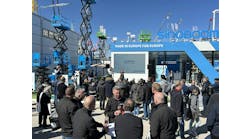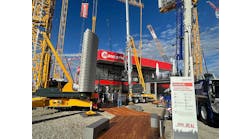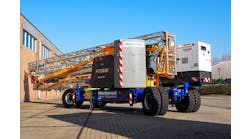Bronto MEWP to Maintain NASA High-Tech Antennas
Mobile elevating work platforms are regularly used to maintain telecom antennas, but not all telecom antennas are the same. When it comes to making a long-distance call, it’s hard to top Deep Space Network operated by NASA’s Jet Propulsion Laboratory (JPL). It’s the largest and most sensitive scientific telecommunications system in the world. A Bronto S230XDT aerial platform was recently delivered to NASA’s Jet Propulsion Laboratory’s facility in Goldstone, Calif., to enable inspection and maintenance of these high-tech antennas.
JPL operates three antenna tracking complexes around the world to communicate with spacecraft. The antennas and equipment at these three complexes make up the Deep Space Network, or DSN. One of the complexes is in Goldstone, Calif., in the Mojave Desert, outside of Canberra, Australia, and one is outside of Madrid, Spain. The three complexes are located approximately 120 degrees apart in longitude, so that as the Earth rotates, one set of antennas is always in view of the spacecraft.
At each complex there are multiple antennas that have a reflector 112 feet in diameter and one antenna that is 230 meters in diameter. These large antennas present a maintenance challenge, to easily get staff up and down the structures to service and maintain the critical equipment. JPL has two Bronto Skylift aerial platforms to assist with this work, one at the Canberra Australia complex and a newly delivered unit at the Goldstone, California complex. California has strict limitation to vehicle axle weights and the S230XDT’s configuration was tailored to fulfill local regulation through collaboration with the local dealer Excel High Reach Inc, the chassis manufacturer and the end customer.
JPL’s new Bronto is a S230XDT aerial mounted on a Mack chassis. The S230XDT features 230 feet working height, 118 feet horizontal outreach and 1500 pounds maximum load in the working cage. Optional equipment includes, for example, power outlets in the cage, various working and warning lights, a wireless intercom between the cage and the turntable and a 360-degree continuous rotation of the turntable. Canberra’s Bronto is the same size class and was delivered in 2005. The units provide access up and over the end of the bowl-shaped reflector and then use the last section of the mast in a horizontal condition to access the microwave equipment that is located near the center of the dish.
The antennas regularly communicate with the two Voyager spacecraft outside of our solar system, with the New Horizons spacecraft that went past Pluto, the Juno spacecraft orbiting Jupiter, with the multiple spacecraft and landers at Mars, with the Parker Solar Probe orbiting the Sun and many others.






